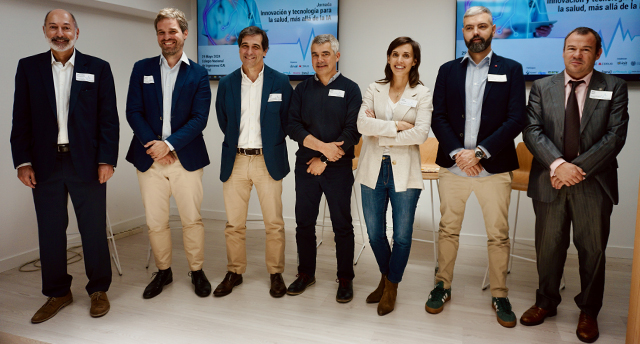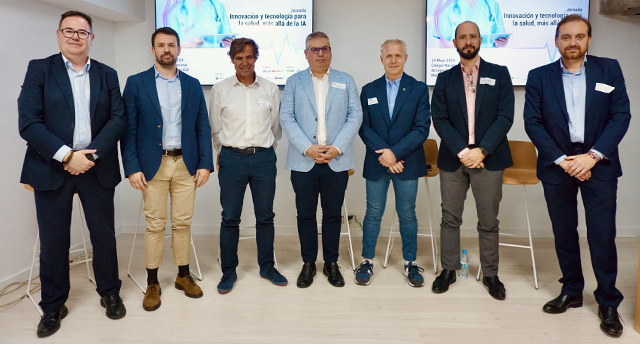On May 29th, the conference organized by Devol RPA and IDRUS, with the collaboration of Inithealth (Init Group), which focused on health, was held with great success in terms of attendance and an interesting line-up of experts.
The event brought together some thirty people, who gathered at the headquarters of the ICAI College/Association of Engineers in Madrid to listen to a dozen experts in different areas of technology applied to healthcare.
During the course of the day it was possible to enjoy the visions, experiences and proposals that the different panelists shared with the attendees. Among the different presentations that took place during the course of the two round tables, we can highlight the words of Francisco Moreira, managing director of Digital Tech events, who commented on how technology must be used wisely to design a solution that really solves the problem.
In the words of Carlos Recio, manager of Idrus: “Technology must have three basic characteristics: improve a service, be usable and reduce costs”. Idrus was, precisely, the one who most amazed the attendees thanks to the demonstration of its voice assistant for automated telephone answering. Recio made a live call to request an appointment with a specialist in a hospital using natural language and requesting information as if he were calling a telemarketer. The demonstration was not only successful, but also highlighted the potential of tools like this to improve customer care systems in healthcare services.

From left to right: Juan Carlos Santamaría, Isaac Arias, Antonio Muiña, Carlos Recio, Elena Torrente, Francisco Moreira and Iñigo Sanz.
As a representative of the DKV Group, as digital health director, Elena Torrente referred to the “exciting time for the use of technology” that we are living. “It is impossible for the current healthcare system to survive without technology.” She also cited several examples of how innovation has taken place in video consultations, home care and remote patient monitoring.
Regarding Artificial Intelligence, Antonio Muiña, director of care management and digital transformation at Cigna Healthcare, commented that these new advances “are capable of detecting melanomas that the human eye is unable to see or even detecting cognitive impairment in a patient with a simple phone call.”
Pedro Yuste, CEO of Savia (Mapfre), explained in similar words: “AI will revolutionize the world of healthcare and at Savia we always take advantage of new opportunities that arise from innovation”.
For Isaac Arias, assistant manager of Viamed’s central area, and Adrián Gómez-Aleixandre, assistant manager of the engineering and procurement department in Viamed’s northern area, the importance of technology “lies in knowing what we are going to do with it, what solution we are going to provide.
The evolution of technology in recent years has been exponential, leaving behind the doubts that were generated when, as Tomás Trenor, director of data and analytics at Sanitas, recalled, “ten years ago, video-consultation, which we pioneered at Sanitas, was seen as something crazy, and today, as a result of the pandemic, we see that it is something that has become normalized”.

From left to right: Iñigo Garatxena, Tomás Trenor, Pedro Díaz, Carlos Ansareo, Carlos Battyán, Adrián Gómez-Aleixandre and Gonzalo López.
Carlos Battyán, an expert healthcare consultant, emphasized the importance of “getting people involved and making technology just another tool and something that they practically don’t notice because it is already well implemented”. Along the same lines, Carlos Ansareo, an expert in innovation and intrapreneurship, stressed that “innovation is about people, not so much about technology, which is a lever, but about people”.
For Iñigo Garatxena, CEO of Absentix, the fight against absenteeism, also in the healthcare sector, involves “using technology to make a good identification of the reasons for absenteeism and, through correct data collection, work to reduce absenteeism rates”.
Finally, Juan Carlos Santamaría, communications director of Inithealth, the technological platform developed by Grupo Init, recalled that a few years ago he was asked “whether it was legal for companies to use data collected from mobile apps or activity-logging bracelets”. He also shared with the audience examples of gamification techniques used by the insurance sector and stressed that the over-55 age group should not be left out.
All this in a very interesting day moderated by Felipe Rebollo, business development and commercial director of Devol RPA, and Gonzalo López, business developer manager for digital health & biomedical technologies of Vicomtech, which concluded with a space for nerworking where attendees could discuss with the speakers their interventions, impressions and points of view.
